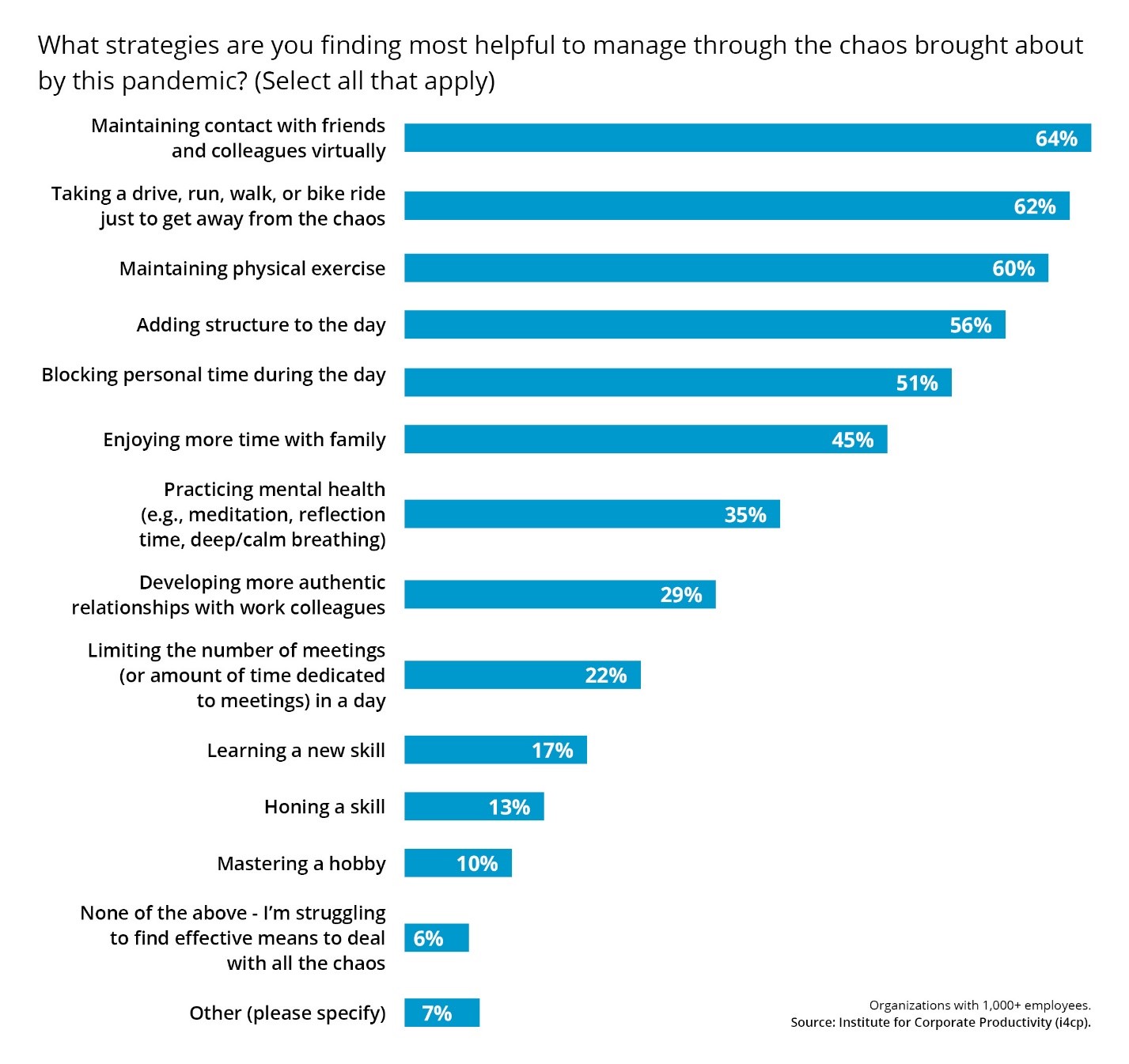Coping Strategies and the Positive Aspects of the Pandemic

A recent CNN Health article described how the pandemic is disrupting our concept of time, as for many of us days and even weeks are blurring together. This can be caused by stress, isolation, or simply the loss of previous routines that helped mark the passage of time. In short, the pandemic is not only taking a toll on the health of many people, it is also causing chaos (in big ways and small) in all our lives.
The Institute for Corporate Productivity (i4cp) asked in a recent survey of HR leaders this question: “What strategies are you finding most helpful to manage through the chaos brought about by this pandemic?”
Not surprisingly, the number-one response (64%) was maintaining contact with friends and colleagues virtually. Although a common phrase these days, we aren’t literally practicing social distancing, but rather physical distancing. If you have high-speed internet and Zoom, Facetime, or another video conferencing platform, you can maintain much of the value of social interaction even while remaining physically separate.
Many of the other top responses were more individual-focused, with respondents stressing the importance of “me time”—62% said they take a solo drive, run, walk, or bike ride just to get away from the chaos, and 60% similarly said maintaining physical exercise in general was a key strategy.
Practicing mental health techniques (e.g., meditation, reflection time, deep/calm breathing) was indicated by 35% of respondents, and learning a new skill or honing an existing skill were mentioned by 17% and 13%, respectively.
Structure is a common antidote to chaos, and these pandemic times are no different; 56% of survey respondents make sure to add structure to each day, and 51% block off personal time during the day.
Even with the many losses and challenges—health, personal, professional, economic, and more—that this pandemic period has brought, there have been some positive outcomes and changes in our work and personal lives. Enjoying time with family was cited by 45% of survey respondents as an important strategy for mitigating the chaos, and 29% said developing more authentic relationships with work colleagues is also helpful.

Both family and work relationships were cited by those surveyed as aspects of this pandemic period that have surprised them in positive ways. Besides improving family and co-worker relationships, the most commonly mentioned pleasant surprises included:
- Remote work. After a one-to-two week adjustment period, and recognizing the temporary challenges posed by kids being out of school, many were surprised that they became as productive, or even more so, compared to their traditional workplace productivity. Many indicated they expect to be given the flexibility to work remotely, at least part of the time, post-pandemic.
- No commute. One reason for strong productivity when working remotely is not having to commute. Many also mentioned the ability to create healthier breakfast and dinner meals for their families, and there clearly is a positive impact on the natural environment as well.
- Work-life balance. As noted, a lack of structure can lead to feelings of chaos, but introducing flexibility can also improve work-life balance, with many survey participants mentioning more time for walks, better health from not eating out, more family time, etc.
- Increased focus. For those unhappy with open-office spaces or who suffered from too many distracting office drive-bys, the ability to work remotely can allow greater focus and therefore increased productivity for individualized tasks.
- Faster decision making. Breaking from unnecessary routines, and the temporary turmoil of the past two months has sometimes meant less bureaucracy, less paperwork, more streamlined processes, and even increased responsiveness in decision making.
- More personal connection to colleagues. Seeing people (and sometimes their children, pets, etc.) in their home environments via video calls led many respondents to say they feel more personally connected to their work colleagues, including leaders, than ever before.
- More trust. For organizations where working from home was not already part of the culture, a significant level of trust was needed. Other key attributes mentioned included increases in authenticity, transparency, humanity, grace, and more.
- More collaboration. While remote work takes some adjustment, and some activities are best done in-person, many participants indicated an increase in some types of collaboration (though for some, collaborative overload has been an issue during this pandemic period).
- Less politics and more accountability. Some noted that there seems to be more of a focus on getting work done and merit-based approaches to performance evaluation. Workers, including leaders, can’t get by simply by showing up and being seen at the office.
- More time for learning new things. Some are leveraging their time savings and productivity boosts by upskilling or reskilling to advance their career or prepare themselves for the next surprise in the economy.
Download the full survey results—due to the current global health and productivity crisis affecting everyone, i4cp is making all related ongoing research publicly available.





